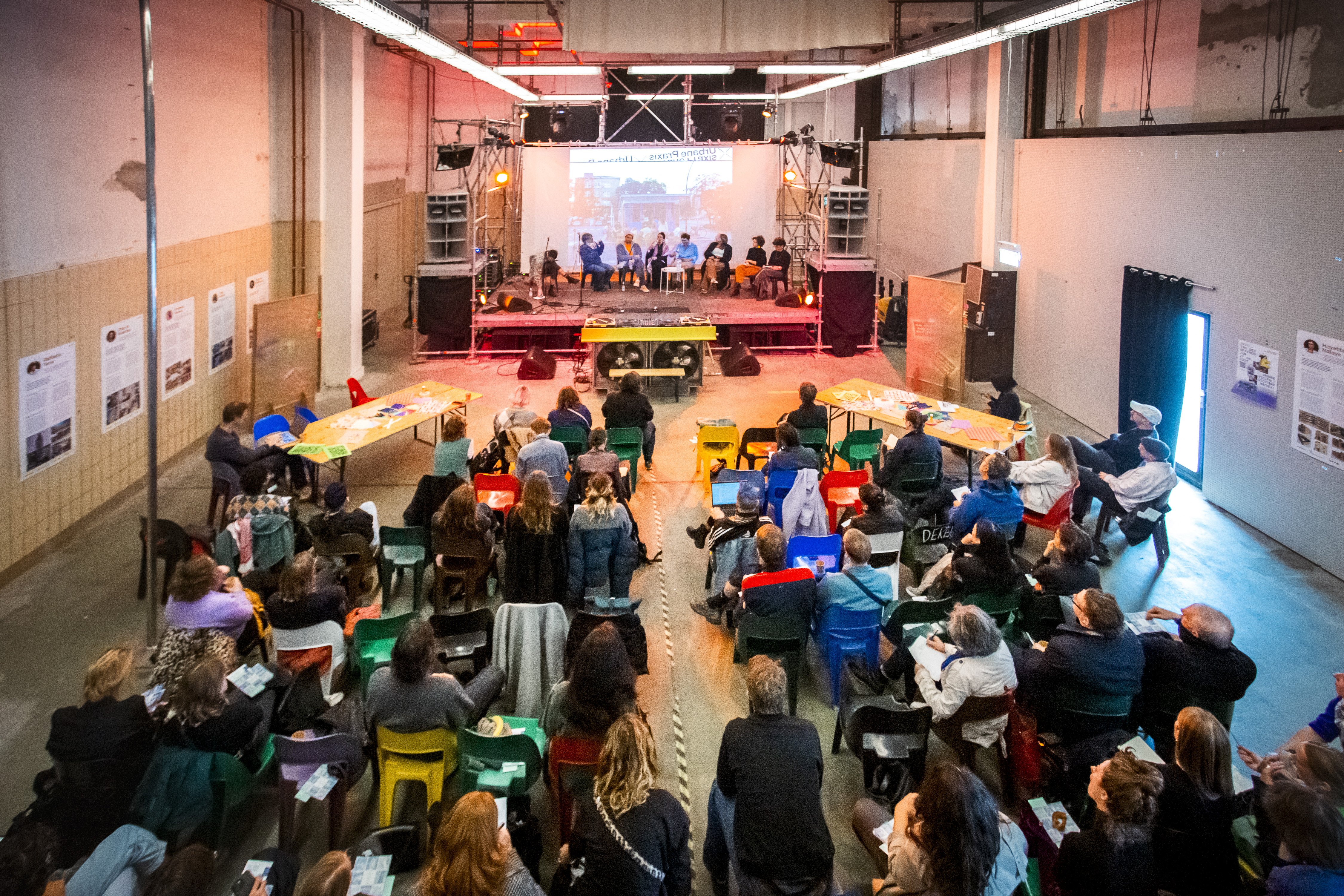Symposium on collective urban development shows: Urban future is created through cooperation for a cityscape of togetherness
Review of the symposium on 26 September 2025
On 26 September, stakeholders from the fields of practice, administration, science and civil society came together to discuss new approaches to collective urban development as part of the Urban Practice – Opportunities for Collective Urban Development symposium. The day provided an opportunity for exchange, networking and joint work on concrete perspectives for a city that is designed not only for, but also with its residents.
The focus was on the demands and experiences from urban practice projects, which served as a starting point for the discussions. In thematic rounds, for example on participation in urban space, sustainable economy, cultural neighbourhood management, mixed financing, and social innovation and science, it became clear that the opportunities for solidarity-based forms of urban design are great when different actors share their expertise and structures remain open to diverse ideas and perspectives.
Demands and theses from discussions with stakeholders, activists, politicians and administrators made this clear.
Urban practice is a connecting structure
Urban Praxis, and in particular the network office, sees itself as an intermediary, transformative structure between civil society, administration, science and urban development policy. Accordingly, the symposium was designed to bring together more than ten interdisciplinary departments at four themed tables – on culture, participation, science and economics. The results of these discussions were grouped into four thematic clusters and show that collective urban design is successful where knowledge, responsibility and design are shared in new collaborations between civil society and politics.
Culture as a driver of urban development
In the ‘Cultural Urban Development’ cluster, it was emphasised that cultural freedom forms the foundation of vibrant, diverse cities. There were calls for permanent, secure locations instead of short-term temporary uses, interdepartmental cooperation in administration, clearly ‘hacking bureaucratic logic’ and systematic knowledge transfer between projects. Urban practice should create spaces in which conflicts can be resolved, perspectives shared and social cohesion strengthened. It was also clearly stated that the common good should take precedence over profit. Cultural venues should no longer be subordinated to real estate logic, but need protection and political backing.
Making participation fair and caring
The second topic addressed the social dimension of urban practice: How can participation be successful? It was discussed that participation must be low-threshold and power-reflective. A clear anti-racist stance and communication with those affected create trust and access for a practice based on response. Urban practice should meet people where they are – in their neighbourhood, at the youth club, at the hairdresser’s, in the community. There were also calls to avoid and revolutionise token participation: co-determination must have a real impact and not be merely a formal accessory. Participation must not remain a privilege for administrative professionals and experts, but must be made understandable and accessible to all.
Linking science and practice
The third cluster focused on the connection between science and urban practice. New alliances between research and practice were called for, for example in the form of real-world laboratories or new models of cooperation between civil society, politics and administration. One focus was on knowledge translation and archiving: findings from projects must remain permanently accessible, e.g. in public libraries or digital archives. The training of future planners and researchers should also become more practice-oriented – through teaching formats in urban spaces, transdisciplinary research and opening up scientific institutions to new perspectives. After all, it is not an intellectual elite that should determine who the experts are, but urban society itself.
Economy oriented towards the common good and long-term structures
The fourth topic dealt with the economic prerequisites for collective urban design. New financing models were called for that focus on the common good rather than profit – such as the continuation of the Berlin Urban Practice Project Fund or partnerships oriented towards the common good. Social processes and networks should be promoted just as much as construction projects. Non-monetary contributions such as commitment, knowledge or contributions in kind should also be recognised. Urban practice must be understood as part of public services – as social infrastructure that is just as important as schools or libraries. The political appeal was also clear: cities must not be sold off any further. Use for the common good must take precedence over speculative exploitation.
Common guidelines and political demands
A common thread ran through all the topics: the call for the removal of barriers, perspectives oriented towards the common good, and new alliances. Participants emphasised the need to overcome obstacles – in administration, in science, and between sectors. There was also a clear desire to make the effects of urban practice more visible and to use them as a legitimate basis for funding and political recognition.
The symposium made it clear that collective urban development has long been more than just an ideal. Many participants took away concrete approaches, collaborations and joint projects. Urban practice is already acting as a bridge builder – between culture and administration, citizens and politics, research and everyday life. The symposium made it clear that a sustainable city is created where knowledge, responsibility and design are shared.
The specific demands from the action weekend will be shared in the coming weeks as a social media campaign on the various channels of Urban Practice and active initiatives.
EVENT DETAILS:
Friday, 26 September – Specialist conference for exchange and networking at the old fire station on the THF grounds
Location: Old fire station, THF grounds
Webadress: https://www.urbanepraxis.berlin/event/fachtag-urbane-praxis-chancen-kollektiver-stadtgestaltung/
Social Media: https://www.instagram.com/urbanepraxisberlin/
